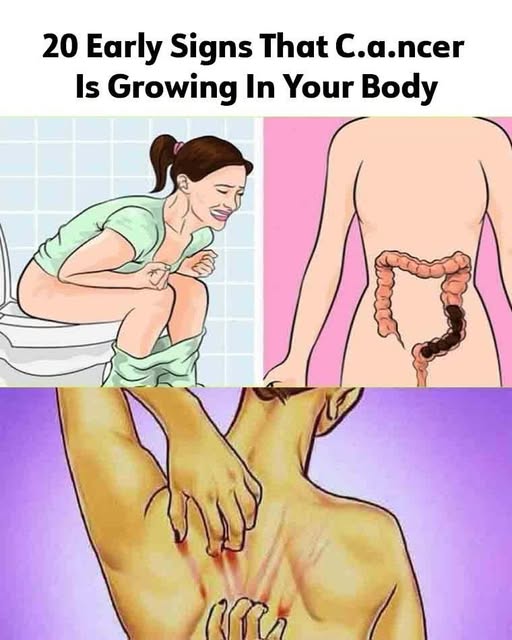
Cancer is often referred to as a “silent killer” because many types develop quietly in the body without obvious symptoms—at least in the early stages. That’s why paying close attention to subtle changes in your body can be crucial. Early detection can make a huge difference in treatment success and overall outcomes.
While many symptoms can be caused by far less serious conditions, it’s important not to dismiss them, especially if they linger or worsen over time. Here are 20 early signs that your body might be fighting cancer—and why you should listen to these signals.
1. Unexplained Weight Loss
Dropping pounds without changing your diet or exercise routine could be an early sign of cancer, particularly cancers of the stomach, pancreas, esophagus, or lungs. If you’ve lost more than 10 pounds unexpectedly, it’s worth getting checked.
2. Persistent Fatigue
We all get tired sometimes, but if you’re constantly exhausted no matter how much rest you get, it could be a red flag. Blood cancers like leukemia or lymphoma can cause chronic fatigue.
3. Changes in the Skin
New moles, changes to existing moles, unusual growths, or dark spots can sometimes signal skin cancer. Other cancers can also cause yellowing of the skin (jaundice) or redness.
4. Persistent Pain
Ongoing pain that doesn’t seem to have a clear cause should never be ignored. Depending on the location, it could point to bone, ovarian, colon, or brain cancer.
5. Frequent Infections or Fevers
If you’re constantly fighting off infections or experiencing fevers without a clear reason, it could be a sign that your immune system is compromised by leukemia or another cancer.
6. Unusual Bleeding
Coughing up blood, blood in your stool, unusual vaginal bleeding, or blood in your urine could all be early signs of various cancers. Always get unexplained bleeding evaluated.
7. Persistent Cough or Hoarseness
If a cough lingers for weeks and isn’t related to a cold or allergy, it could be an early warning sign of lung cancer. Hoarseness could also be linked to cancers of the throat or larynx.
8. Difficulty Swallowing
Feeling like food is getting stuck in your throat or chest can be a symptom of esophageal cancer or throat cancer.
9. Changes in Bowel or Bladder Habits
Sudden, persistent changes like diarrhea, constipation, blood in the stool, or needing to urinate more (or less) frequently can indicate cancers of the colon, bladder, or prostate.
10. Sores That Don’t Heal
A sore that doesn’t heal after a few weeks could be a warning sign of skin cancer or cancers in the mouth.
11. Unusual Lumps or Swelling
A lump under the skin—whether it’s painless or tender—should never be ignored. Lumps can be found in the breast, testicles, lymph nodes, or soft tissues.
12. Persistent Indigestion or Heartburn
Ongoing indigestion or heartburn could point to stomach or esophageal cancer, especially if it doesn’t improve with usual treatments.
13. Changes in the Mouth
White or red patches inside the mouth or on the lips can be early indicators of oral cancer, especially in people who smoke or chew tobacco.
14. New or Worsening Headaches
Frequent or worsening headaches that don’t respond to usual treatment could be a symptom of a brain tumor.
15. Difficulty Breathing or Shortness of Breath
If you’re struggling to catch your breath even during normal activities, it might be a symptom of lung cancer or other respiratory-related cancers.
16. Unusual Bruising
Easy or unexplained bruising, especially in unusual places like your back, hands, or legs, can sometimes point to leukemia.
17. Swollen Lymph Nodes
Swollen or tender lymph nodes, especially around the neck, underarm, or groin, can be signs of lymphoma or other cancers affecting the immune system.
18. Bone Pain or Fractures
Bone pain, fractures from minimal trauma, or persistent joint discomfort could signal cancers that have spread to or started in the bones.
19. Abdominal Pain or Swelling
Bloating, pain, or feeling full even after eating little could be signs of ovarian cancer or other abdominal cancers.
20. Changes in Appetite
Losing interest in food or feeling full very quickly could be associated with various types of cancer, including stomach, ovarian, or pancreatic cancers.
When to See a Doctor
While none of these symptoms automatically mean you have cancer, ignoring them could delay important treatment. If you notice any unusual changes in your body—especially ones that persist for more than a few weeks—it’s wise to consult your doctor.
Keep in mind:
-
Early-stage cancer often feels very “normal.”
-
Many of these signs are subtle and easy to dismiss.
-
It’s always better to check something out early rather than later.
Your health is worth taking seriously. In many cases, early detection makes all the difference between a successful treatment and a more difficult road ahead.
Final Thoughts
Your body is always sending you signals—sometimes whispers, sometimes loud alarms. Listening to these messages and acting early can save your life. Don’t panic over every ache or bump, but stay mindful and trust your instincts if something feels off.
Health is precious, and awareness is your best defense. Paying attention to subtle changes today could make all the difference tomorrow.





